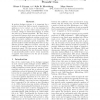202 search results - page 4 / 41 » Comparing Humans and Automatic Speech Recognition Systems in... |
ICASSP
2009
IEEE
14 years 15 days ago
2009
IEEE
When exposed to environmental noise, speakers adjust their speech production to maintain intelligible communication. This phenomenon, called Lombard effect (LE), is known to consi...
SPEECH
2002
13 years 5 months ago
2002
In this paper we present a hypothesis-verification approach for a Spanish Recognizer of continuously spelled names over the telephone. We give a detailed description of the spelli...
ISCAS
2008
IEEE
14 years 5 days ago
2008
IEEE
Abstract— Especially for tasks like automatic meeting transcription, it would be useful to automatically recognize speech also while multiple speakers are talking simultaneously....
CHI
2004
ACM
14 years 6 months ago
2004
ACM
Despite the ready availability of digital recording technology and the continually decreasing cost of digital storage, browsing audio recordings remains a tedious task. This paper...
ANLP
2000
13 years 7 months ago
2000
In spoken dialogue systems, it is important for a system to know how likely a speech recognition hypothesis is to be correct, so it can reprompt for fresh input, or, in cases wher...

